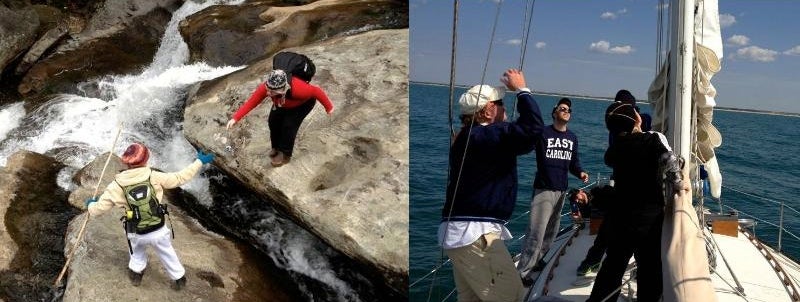Wilderness Writing: Bringing Interdisciplinary Writing to Bear on Environmental Ethics
(Today’s blog post comes from Stephanie West-Puckett, teaching instructor in the department of English and Associate Director of the Tar River Writing Project. Stephanie teaches first-year and advanced writing courses; in her research, she investigates digital literacies and the impact of digital cultures on student writing practices. Currently, she serves as the project coordinator for TRWP’s Project Connect at J. H. Rose high school in Greenville.)
by Stephanie West-Puckett
 In Spring 2011, Dr. Ashley Egan from Biology designed a new course that would increase students’ awareness of the natural world and wilderness while challenging them to formulate a public environmental ethic. Drawing from her experience as a field botany instructor and from a deep knowledge of biodiversity and systematics, she was confident teaching the natural science content but felt the course would be strengthened by partnering with a faculty member who specialized in writing studies and the teaching of writing. I was thrilled to jump on board, and together, we co-designed and co-taught Wilderness Writing as an Honors College seminar that brought interdisciplinary knowledges to bear on problems of environmental ethics. Through a combination of scientific and cultural readings and discussion, intensive immersion in wilderness settings, and writing about nature for a variety of audiences, purposes, and media, students developed arguments about the definitions, values, and purposes of “wilderness”, and published ethical manifestos to communicate those understandings to a broad public.
In Spring 2011, Dr. Ashley Egan from Biology designed a new course that would increase students’ awareness of the natural world and wilderness while challenging them to formulate a public environmental ethic. Drawing from her experience as a field botany instructor and from a deep knowledge of biodiversity and systematics, she was confident teaching the natural science content but felt the course would be strengthened by partnering with a faculty member who specialized in writing studies and the teaching of writing. I was thrilled to jump on board, and together, we co-designed and co-taught Wilderness Writing as an Honors College seminar that brought interdisciplinary knowledges to bear on problems of environmental ethics. Through a combination of scientific and cultural readings and discussion, intensive immersion in wilderness settings, and writing about nature for a variety of audiences, purposes, and media, students developed arguments about the definitions, values, and purposes of “wilderness”, and published ethical manifestos to communicate those understandings to a broad public.

…
Wilderness Writing: Bringing Interdisciplinary Writing to Bear on Environmental EthicsRead More »
Wilderness Writing: Bringing Interdisciplinary Writing to Bear on Environmental Ethics Read More »